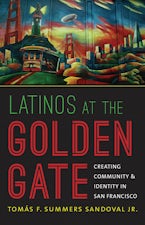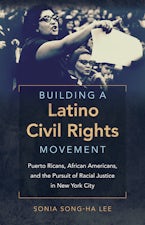Raza Sí, Migra No
Chicano Movement Struggles for Immigrant Rights in San Diego
By Jimmy Patiño
356 pp., 6.125 x 9.25, 13 halftones, notes, bibl., index
-
Paperback ISBN: 978-1-4696-3556-9
Published: November 2017 -
E-book EPUB ISBN: 978-1-4696-3557-6
Published: October 2017 -
E-book PDF ISBN: 979-8-8908-5344-8
Published: October 2017 -
Hardcover ISBN: 978-1-4696-3555-2
Published: November 2017
Justice, Power, and Politics
Buy this Book
- Paperback $35.00
- Hardcover $99.00
- E-Book $24.99
For Professors:
Free E-Exam Copies
By placing the Chicano and Latino civil rights struggle on explicitly transnational terrain, Patiño fundamentally reorients the understanding of the Chicano movement. Ultimately, Patiño tells the story of how Chicano/Mexicano politics articulated an “abolitionist” position on immigration--going beyond the agreed upon assumptions shared by liberals and conservatives alike that deportations are inherent to any solutions to the still burgeoning immigration debate.
About the Author
Jimmy Patiño is assistant professor of Chicano and Latino studies at the University of Minnesota.
For more information about Jimmy Patiño, visit
the
Author
Page.
Reviews
“Patiño’s powerful analysis will challenge and occupy scholars of immigration studies, community mobilization, and identity politics for generations to come.”—American Historical Review
“Capably chronicles the conflicting and shifting attitudes toward immigrants among Chicano activists from the late 1960s through the 1980s . . . . An important examination of the role of place and of flexible notions of identity in shaping a social movement.” —Journal of American History
“The most valuable lesson learned from Patiño’s book is the author’s uncompromising critical review of the Chicano military history and of activists’ transition to more nuanced perspectives of La Raza.” —Western Historical Quarterly
“A sharp, well-written history. In a single community study, Patiño expertly shows the development of an important set of ideas that continues to impact both the field and its practitioners.” —Pacific Historical Review
“This fine work of history exemplifies strong archival and oral historical research, clear writing, and sound argumentation about topics of pressing importance. Patiño provides a new foundation for future academic research, and his book will sharpen, frame, and animate conversations about the United States and Mexico in classrooms, living rooms, and think tanks in both countries.” —Stephen Pitti, Yale University
“Studies of social movements usually center on commonality and shared struggles. In this powerful book, Patiño complicates this narrative, telling the story of historic mobilizations of Chicana/os and Mexican immigrants in which people organized across their differences in national and legal status and in the process created a broader type of solidarity and shared identity.”—Natalia Molina, author of How Race Is Made in America



